
|
![]()
Greatest Films of the 1990s
1990 | 1991 | 1992 | 1993 | 1994 | 1995 | 1996 | 1997 | 1998 | 1999
Title Screen Film Genre(s), Title, Year, (Country), Length, Director, Description 

Age of Innocence (1993), 138 minutes, D: Martin Scorsese



Farewell My Concubine (1993, China/HK) (aka Ba wang bie ji), 171 minutes, D: Chen Kaige



The Fugitive (1993), 130 minutes, D: Andrew Davis



Groundhog Day (1993), 101 minutes, D: Harold Ramis
Self-centered, pompous and cynical Pittsburgh weatherman Phil Connors (Bill Murray) is forced to repeat his most unfavorite day, Groundhog Day (February 2nd), over and over again in this hysterically-funny, allegorical romantic fantasy-comedy. His assignment, for the sixth year, is to cover the famous Punxsutawney (PA) Phil -- the "official" groundhog -- a furry animal that predicts if Spring will have to wait another six weeks if it sees its own shadow. The thought-provoking story line by co-scriptwriter Danny Rubin, a meaningful existential thesis, was more or less a version of the Oscar-nominated, live-action short film 12:01 PM (1990) by Jonathan Heap, which was later expanded into a feature-length, science-fiction TV film titled 12:01 (1993), directed by Jack Sholder. The exact reason for the countless time-warp loop is never explained as the same day endlessly repeats itself, not even interrupted by Connors' numerous deaths and suicide attempts. As an Everyman stuck in repeating time, Phil's reaction to his situation moves from disbelief and denial, to annoyance and then anger, to chicanery and lustfulness, to despair and depression, and then to bargaining and finally to acceptance and philanthropy, as exemplified by his repeated dealings with the supremely annoying insurance salesman named "Needlenose" Ned Ryerson (Stephen Tobolowsky). Perhaps Murray's own Phil must remove the shadow from his own life, change his behavior, and become a better person before he can continue it. His relentless deja-vu experiences gradually change him from a grouch to a decent human being. Perhaps his life's wake-up call and endless reincarnations assist him in perfectly winning the heart of beautiful TV producer Rita (Andie MacDowell).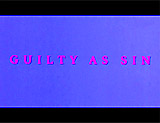



Guilty As Sin (1993), 107 minutes, D: Sidney Lumet
In this inferior, preposterous cat-and-mouse dramatic thriller (similar to Jagged Edge (1985)), the plot introduced successful, ambitious and over-confident female criminal defense attorney Jennifer Haines (Rebecca DeMornay) in Chicago, who was dating fellow lawyer Phil Garson (Stephen Lang). She took on the defense of accused murderer David Edgar Greenhill (Don Johnson), a sexually-aggressive womanizer who was about to gain his dead wife Rita's (Brigit Wilson) fortune. Suffering from clinical depression, she had taken a fall from their high-rise apartment window. The film's tagline described the entire setup: "She's finally met her match. He's handsome, wealthy, seductive. A Real Lady Killer." Before the case commenced, Haines employed her longtime, 72 year-old private investigator Moe (Jack Warden) to look into the shady background of her client (Greenhill was found to have previously married older wealthy women who turned up dead). Haines found herself duped and enveloped by her slick playboy client's fixated attentions and stalkings: constant phone-calls, and delivery of dry-cleaning to her office (with dropped hints of a sexual relationship). When Haines requested that Judge (Dana Ivey) remove her from the case, due to Greenhill's unpaid fees, she was declined. She could not have evidence of Haines' past (serial killer) guilt brought to light, constrained by the attorney-client privilege of confidentiality. Haines was assisted by Emily (Norma Dell'Agnese) during the case, while the prosecutor was DiAngelo (Ron White). Just prior to Rita's death, she had repeatedly called the police to report her fears, and she had allegedly sent a letter to state authorities fearing she might be murdered by her husband. During the trial, the prosecution (with a handwriting expert) declared the letter phony - it was intimated that it was written by Greenhill himself, to discredit the prosecution's case. In an attempt to betray her client, Haines planted incriminating evidence in his apartment and then tipped off the police with an anonymous phone call. Greenhill was suspicious and caught on to the ploy, and assaulted her boyfriend Phil. To bolster his case at the last minute, Greenhill presented surprise witness Kathleen Bigelow (Barbara Eve Harris) who testified that she was having sex with Greenhill at the time of the crime. The trial concluded with a hung jury and mistrial. In private, however, Greenhill confessed his "guilty as sin" status to Haines, and declared that he knew she had tried to discredit him with planted evidence. In the film's closing minutes, Greenhill confronted and knocked Moe unconscious in an ambush - he had gathered damning evidence of previous wrong-doing. He left Moe and the evidence in the burning building. Haines and Greenhill struggled on a balcony and both toppled over - Greenhill softened Haines' fall and perished, while she survived with serious injuries.




In the Line of Fire (1993), 128 minutes, D: Wolfgang Petersen
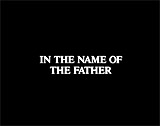


In the Name of the Father (1993, UK/Ireland), 133 minutes, D: Jim Sheridan
The setting of this historical/biographical drama about wrongful imprisonment was Belfast, Northern Ireland in 1974. During a series of IRA (Irish Republican Army) bombing attacks against the British, two explosions occurred at a Guildford pub outside London, killing five and wounding dozens of others. Suspected petty thief and drug user Gerry Conlon (Daniel Day-Lewis) and friend Paul Hill (John Lynch) were charged with the crime and arrested, and held for seven days, although they had a sound alibi on the night of the bombing - they were engaged in a robbery of a prostitute's apartment in London, and speaking to homeless man Charlie Burke (Joe McPartland). The Chief Inspector Robert Dixon (Corin Redgrave), using coercion by torture (and ignoring their alibi), forced the signing of a confession of murder by Conlon and Hill, and two others: Carole Richardson (Beatie Edney) and Paddy Armstrong (Mark Sheppard) - known collectively as the Guildford Four. The group was suspected of being IRA sympathizers. There were seven other related defendants (primarily members of Gerry's extended family), known as the Maguire Seven (one of whom was Giuseppe Conlon (Pete Postlethwaite), Gerry's father), charged with being accessories to the bombing (by bomb-making and terrorist associations). The trial was quick and grossly unfair. Although the defendants claimed their innocence, and there was no evidence other than coerced confessions, the Guildford Four were sentenced to life imprisonment. There were sentences of 12-15 years for the Maguire Seven. While father and son, Giuseppe and Gerry Conlon shared a prison cell, the actual IRA terrorist bomber of Guildford, Joe McAndrew (Don Baker) was also incarcerated, and he admitted his guilt to them. 15 years after the Conlons' convictions, compassionate British civil rights lawyer Gareth Pierce (Emma Thompson), who had been called upon by Gerry to defend the Guildford Four (and the Conlons), thus set up the film's plot that was described in its tagline: "Falsely accused. Wrongly imprisoned. He fought for justice to clear his father's name." The defense faced numerous obstacles, but eventually uncovered a private, archived record of Inspector Dixon's interview with Charlie Burke - providing Gerry Conlon with a vindicating alibi. On the stand, Dixon was accused of lying and concealing evidence, forcing the judge to dismiss the charges against both falsely-accused groups. Unfortunately, six of the seven Maguire Seven had already served their sentences, and Giuseppe had already died in prison. Outside the courtroom, Gerry spoke: "I'm an innocent man. I spent 15 years in prison for something I didn't do. I watched my father die in a British prison for something he didn't do. And this government still says he's guilty. I want to tell them that until my father is proved innocent, until all the people involved in this case are proved innocent, until the guilty ones are brought to justice, I will fight on. In the name of my father and of the truth!" The film's postscript stated, in part: "The IRA men who admitted they were responsible for the Guildford pub bombing have never been charged with the offense. They remain in British prisons to this day. Three ex-detectives were acquitted of conspiring to pervert the course of justice after their trial May 19, 1993. No policeman has been convicted of any crime in this case."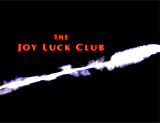
The Joy Luck Club (1993), 139 minutes, D: Wayne Wang





Jurassic Park (1993), 126 minutes, D: Steven Spielberg
Steven Spielberg's award-winning adventure film (dubbed "Jaws" with dinosaurs) was praised for its groundbreaking Best Visual Effects. This big summer hit in the early 1990s, one of the highest-grossing films of all time, was adapted from Michael Crichton's cautionary novel. It was set at an unusual wildlife theme park located on a secluded island off the coast of Costa Rica. Misguided philanthropist-entrepreneur Hammond (Richard Attenborough) and genetic scientists had created a variety of cloned dinosaurs - at first a majestic sight. However, a horrifying chain reaction of events included the scary breakout of a giant ferocious, carnivorous Tyrannosaurus Rex (computer-generated and modeled), throwing the rain-forest park into chaos and threatening the park's tour vehicles filled with scientists, engineers, lawyers, and children. Later, the kids were confronted by and battled two smart and carnivorous Velociraptors in a frightening kitchen sequence.

Menace II Society (1993), 97 minutes, D: Allen and Albert Hughes


Mrs. Doubtfire (1993), 125 minutes, D: Chris Columbus
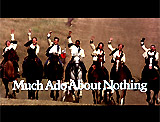



Much Ado About Nothing (1993, UK), 111 minutes, D: Kenneth Branagh
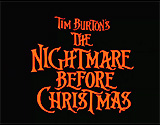



The Nightmare Before Christmas (Tim Burton's) (1993), 76 minutes, D: Henry Selick
AKA: Tim Burton's The Nightmare Before Christmas. A charming, ground-breaking, macabre fantasy-musical film in its use of computers to aid the complex, painstaking stop-motion animation process. This is the first full-length stop-motion animated film, based on the parodic poem of the same name by visionary producer Burton, written when he was a Disney animator. This original, fanciful yet twisted tale is about a bored, depressed and skeletal Jack Skellington (Chris Sarandon with Elfman supplying his singing voice) with shy rag-doll Sally (Catherine O'Hara) as his understanding and loyal girlfriend from afar. Jack grows weary of his repetitive role as the Pumpkin King of Halloween Town with its pagan holiday. When he discovers the enchanting, radically-different Christmas Town and its leader Santa Claus (Edward Ivory), he becomes obsessed with trying to capture the town's joy. His well-meaning but disastrous mission to steal the holiday puts Santa Claus into jeopardy when he is kidnapped and tortured. An extraordinary achievement, from its wonderfully realized set designs -- like the dark, The Cabinet of Dr. Caligari-ish and The Night of the Hunter-ish Halloween Town and the round, bright Christmas Town (based on Seuss' artwork, reminiscient of Whoville) -- to the jazzily unorthodox lyrics by Oingo Boingo's Elfman ("And since I am dead / I can take off my head / And recite Shakespearean quotations"). The film was largely ignored in its initial release, but gained a dedicated following on video release that grew quickly.


Philadelphia (1993), 125 minutes, D: Jonathan Demme
Jonathan Demme's milestone film was one of the first mainstream Hollywood films to address the issues of homosexuality and homophobia, in a case of wrongful termination. It was the story of senior law associate Andrew Beckett (Tom Hanks) in a prestigious Philadelphia law firm led by Charles Wheeler (Jason Robards). Although Beckett had been keeping it a secret that he was a gay man suffering from HIV/AIDS, he was chosen to represent High-Line, a high-tech company involved in a copyright infringement lawsuit. During his preparations for the case, he remained at home and papers that he filed at work were temporarily misplaced or lost. Beckett was fired for his sloppy work, although he attributed his sacking to suspicions that he had AIDS, due to an obvious lesion on his face. Although reluctant to represent Beckett at first, personal injury attorney Joe Miller (Denzel Washington), with an intense fear of germs and slightly homophobic, accepted the defense assignment. Belinda Conine (Mary Steenburgen) represented the large Wheeler corporate law firm. During the trial held about seven months later, Beckett's health had already deteriorated and worsened, and he was visibly ill. Miller had to prove that Beckett's firm had deliberately hidden his case papers as a pretext and excuse to fire him (after learning of his diagnosis and panicking). Miller would argue that Beckett was protected by the Americans with Disabilities Act. Firm lawyers Wheeler and Walter Kenton (Robert Ridgely) testified that they were unaware of Beckett's illness or visible lesions (and that Beckett had indeed concealed his lifestyle and illness). They claimed that Beckett was fired instead for incompetence and sloppy work. Defense attorney Conine repeatedly suggested that Beckett had invited his illness through promiscuity and was therefore not a victim. In one of the most dramatic scenes, Conine held a mirror up to Beckett's face, illustrating that he had no lesions. However, it was further demonstrated that Beckett had lesions on his chest when he opened his shirt (similar to the one he had earlier on his face). Beckett also confirmed that he had probably acquired AIDS through anonymous sex with a stranger in a gay porno movie house known as the Stallion Cinema. As the trial proceeded, Beckett was hospitalized and near death when the jury came to the conclusion that he was fired because he had AIDS. Beckett was awarded back pay, 'pain and suffering' and compensatory punitive damages, while his law firm promised to appeal the decision. In the final scene Beckett died in the presence of his longtime companion Miguel (Antonio Banderas).

The Piano (1993, NZ/Australia/Fr.), 121 minutes, D: Jane Campion
New Zealand director/screenwriter Jane Campion's third feature -- a compelling, disturbing, erotic and psychosexual costume drama about a mute mail-order bride, a refined European woman named Ada McGrath (Holly Hunter), who travels with her spiteful 9-year-old daughter Flora (Anna Paquin) from 1850s Scotland to the New Zealand wilderness for an arranged marriage with patriarchal British emigrant landowner Alisdair Stewart (Sam Neill). Upon arrival, her prized possession, a piano, is insensitively left on the desolate coastal beach and later rescued-sold to a coarse, illiterate and tattooed Maori settler (Stewart's overseer) named George Baines (Harvey Keitel). The headstrong Ada is left despondent, and artistically and emotionally frustrated without the outlet of her piano-playing. Although she is repulsed by George, she is offered a blackmailing sexual deal with him to slowly buy back the piano and give him a series of piano lessons. Soon, their relationship is transformed into a torrid love affair and sensual/emotional liberation for the two, while she never consummates her marriage with the shy Alisdair. Campion's Academy Award nomination as Best Director made her only the second woman in Oscar history to be nominated in the category. The film won three Oscars: Best Actress (Holly Hunter), Best Supporting Actress (Anna Paquin), and Best Original Screenplay (Jane Campion).


The Remains of the Day (1993, UK), 134 minutes, D: James Ivory



Schindler's List (1993), 197 minutes, D: Steven Spielberg
Spielberg's greatest dramatic, black and white masterpiece, based on a true story of an opportunistic German businessman and charming womanizer Oskar Schindler (Liam Neeson), who profits from WWII by employing cheap labor from Polish Jews in his Cracow cookware factory during the Third Reich's Holocaust, and provides them refuge from the horrors of the Nazis. The film also documents the hideous, disturbing evil personified by Nazi Amon Goeth (Ralph Fiennes) - the Plaszow camp commandant, Schindler's relationship with his Jewish accountant Itzhak Stern (Ben Kingsley) and their list-making to courageously save over 1,000 Jews from the senseless, brutal extermination in Auschwitz.




Shadowlands (1993, UK), 133 minutes, D: Richard Attenborough


Short Cuts (1993), 189 minutes, D: Robert Altman
Another meandering, highly-regarded Robert Altman work with the themes of dysfunctionality, infidelity, suicide, jealousy, and obsession. The complex and sprawling film, a three-hour ensemble film, was a set of ten seamlessly-interlinked stories involving six couples - all angst-ridden, shallow, and desperate Los Angeles residents living in suburbia. He nakedly depicted the alienated and estranged lives of the twenty-two characters, including: a phone-sex industry mother, a grieving couple whose son was an auto accident victim, a diner waitress (the hit-and-run driver) and her abusive drunk husband, a sinister and lonely baker, three fishing buddies who made a chilling discovery, an arrogant, philandering motorcycle cop and his long-suffering wife, a self-absorbed and boozing jazz-singing mother and her depressed cellist daughter, and a vengeful ex-husband with a chain-saw. In one of the memorable vignettes, a suspiciously-jealous and arrogant surgeon Ralph Wyman (Matthew Modine) and his red-haired wife Marian Wyman (Julianne Moore), a painter of nudes, bickered together. During their vicious argument scene, she fearlessly exposed all of her emotions - and her waist-down nakedness as she blow-dried her wine-stained dress with a hair-dryer. Marian reluctantly admitted to the accusations of infidelity of her uptight, angry husband, who was still harboring jealousy after three years. He demanded to know all the details of a past, impersonal, drunken sexual encounter she had in a car with artist friend Mitchell Anderson. All of the vignettes ended with a massive earthquake.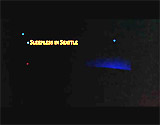



Sleepless in Seattle (1993), 105 minutes, D: Nora Ephron
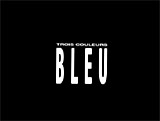

Trois Couleurs: Bleu (1993, Fr./Pol./Switz.) (aka Three Colors: Blue), 100 minutes, D: Krzysztof Kieslowski
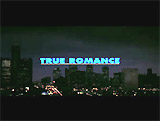


True Romance (1993), 116 minutes, D: Tony Scott